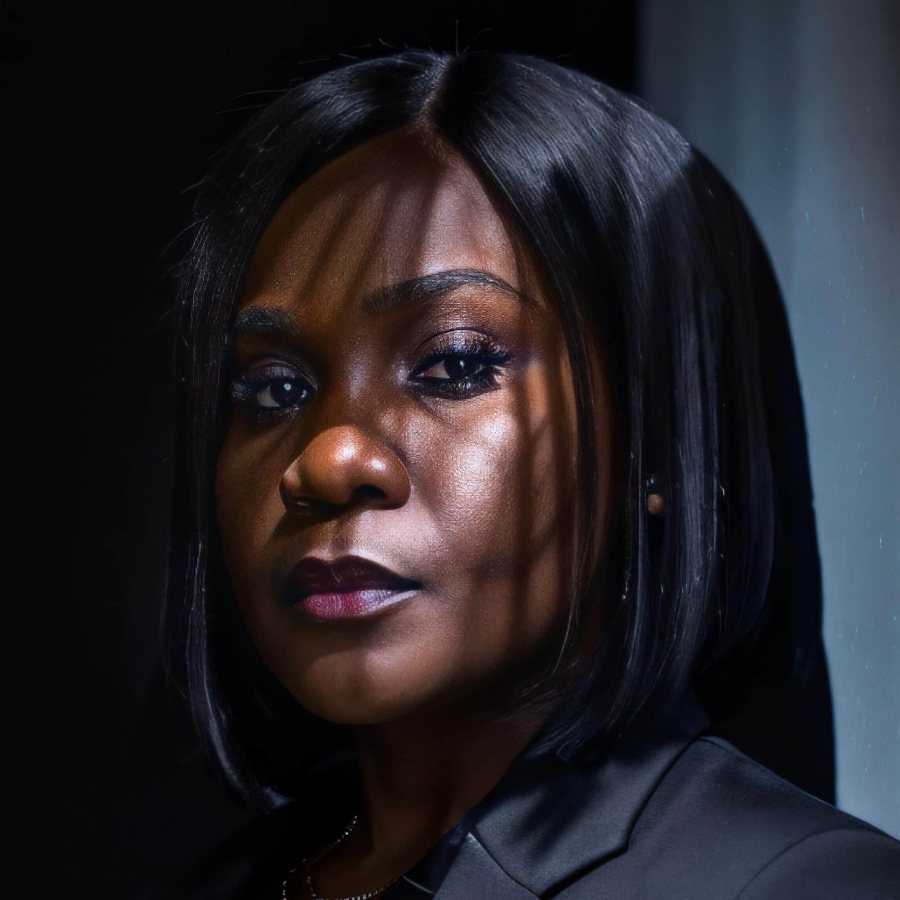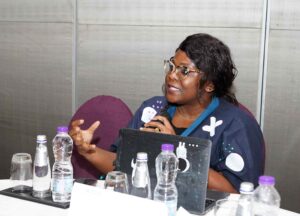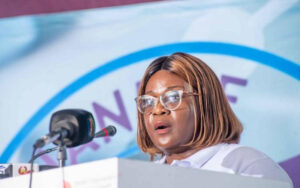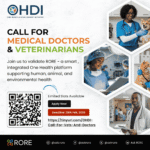
Meet Dr. Wande Alimi, our distinguished One Health personality of the month for August!
Dr. Wande Alimi is the One Health Unit Lead at Africa CDC. She has dedicated her career to advancing animal, public, and environmental health across Africa. With a background in Veterinary Surgery and Public Health, Dr. Alimi has been instrumental in addressing zoonotic diseases, antimicrobial resistance, food safety, and climate change. In this exclusive interview with OHDI, she shares some remarkable insights into how her leadership has led to significant milestones, including the African Union’s political declaration on antimicrobial resistance.
Hello, Dr. Wande. We are excited to have you as our One Health Personality of the Month.
Please introduce yourself and tell us about your profession and educational background, including your past and current experiences in relation to One Health.
My name is Wande Alimi, and I am the One Health Unit Lead at the Africa Centres for Disease Control and Prevention (Africa CDC). Africa CDC is a specialised technical agency of the African Union supporting the 55 African Union Member States. My work focuses on strengthening the One Health approach in areas such as zoonotic diseases, antimicrobial resistance (AMR), climate change, and food safety across the continent. I am a trained Veterinary Surgeon who has completed postgraduate studies in International Health and Public Health. I have years of experience practising at a national level, working in research and policy implementation across African Union Member states.
What inspired you to pursue a career in Veterinary Medicine and Public Health, and how did your journey lead you to your current role at Africa CDC?
I don’t exactly remember what inspired me to pursue my first degree; I was young. However, in terms of moving into public health, I practised as a veterinary surgeon for about five years in Abuja, Nigeria. Most of my work involved small animal and equine surgery, but I also encountered zoonotic disease outbreaks. For instance, during my time in Abuja, we dealt with the highly pathogenic avian influenza outbreak, which brought me closer and inspired my keen interest in the human and animal interface of disease outbreaks. I also did some risk communication work, particularly for World Rabies Day, as part of efforts to achieve the 2030 goal of eliminating rabies.
But I think I have always had a keen interest in One Health, particularly in the interlinkages between human health, animal health, and the environment. For example, my undergraduate thesis focused on the effectiveness of vaccines for zoonotic diseases in preventing outbreaks. This interest kept growing, leading me to pursue a master’s degree in Public Health and continue to work in global health. Joining the Africa CDC helped me to naturally find my niche in the One Health space, focusing on how different sectors can work together to improve health outcomes. I must say, I have been lucky to have the best of mentors who have helped me grow and advance in my career.

As the One Health Unit Lead at Africa CDC, what key achievements or milestones are you most proud of?
One of the achievements I am most proud of as a public health professional is bridging the gap between politics and health. Often, technical experts know what needs to be done, but there is a gap between us and policymakers, like Ministers of Finance or Heads of State, who control national budgets. Over the past seven years at Africa CDC, one of the key achievements has been leading the political declaration on antimicrobial resistance (AMR), which was endorsed by the African Union Heads of State in February 2020 as the AU Assembly Declaration 33, the African Common Position on AMR.
Up until a few years ago, AMR seemed like a looming threat but was not taken seriously at the continental level. Through our work at Africa CDC, which I led, we got the Ministers of Health and Ministers of Agriculture and Environment of the 55 AU member states to endorse the African Common Position on AMR. This effort led to the endorsement of the Assembly/AU/Decl.3(XXXIII) Declaration on African Common Position on Antimicrobial Resistance by the African Union Heads of State and Government. This is a significant milestone in addressing AMR on the continent, alongside the huge political commitment by the African Leaders.
What is your vision for the future of One Health in Africa, and how do you see the role of the Africa CDC evolving in this context?
Africa is an ideal place to demonstrate One Health, a concept that recognises the interdependence of human, animal, and environmental health. The principle of Ubuntu, which means “I am because we are,” is intrinsic to African culture and aligns perfectly with the One Health approach. For example, we need to understand that the health of the animals we consume and the safety of our natural resources are critical to our own health. In recent years, I have seen the spirit of One Health coming to life across the continent, with different sectors collaborating during outbreaks like COVID-19. For instance, veterinary laboratories supported human health laboratories in testing for COVID-19, and Veterinarians worked with Epidemiologists on joint outbreak investigations and risk communication.
At Africa CDC, we aim to strengthen One Health platforms and institutionalise mechanisms for collaboration. This includes formal agreements between human, animal, and environmental health sectors, as well as academia, research, and non-state actors. Our goal is to enhance shared efforts for the good of the African community. We are also advocating for stronger financing and capacity-building across sectors, preparing for future pandemics that may be of zoonotic origin.
The work I lead at Africa CDC focuses on four critical One Health issues: zoonotic diseases, antimicrobial resistance, food safety and security, and climate change. Our efforts aim to strengthen the core capacities and capabilities of African countries to adopt a One Health approach to these shared health threats.

As a key stakeholder in the fight against Antimicrobial Resistance (AMR), a major One Health issue, what practical, home-based strategies have you found most effective in combating AMR at a continental level?
AMR is one of the world’s biggest challenges. This year is particularly important because, in September, we will gather for the second time at the UN General Assembly High-Level Meeting on AMR to discuss clear targets and political resolutions. However, on a day-to-day level, AMR is very important to the average African.
Unlike many infectious diseases like HIV, malaria, or cholera, AMR is faceless yet affects and impacts our lives. So, maybe the question should be, “What can I do as an African to address AMR?“
First, we need to recognise that protecting antimicrobials is our shared responsibility. Controlling AMR requires a lot of behaviour change. For example, do I really need to take an antibiotic just because I have a little itch in my throat? If an antibiotic is prescribed for five days, the responsible thing to do is to complete the course, even if I feel better by the second day.
Also, incorporating stronger hygiene measures can potentially reduce infections and, subsequently, the need for antibiotics, antifungals, or antivirals. For instance, during the COVID-19 pandemic, we washed our hands, used sanitisers, and wore face coverings. These are practices we need to continue to reduce infections. Cleaner hospitals, serious infection prevention measures, and improved personal hygiene can reduce AMR’s impact across Africa. We need to understand that AMR affects everyone and requires a conscious effort.
Additionally, as a backyard farmer, you must ask yourself, “Do I need to give antibiotics to my chickens, or is it better to vaccinate them?” Improper disposal of drugs can also increase drug resistance. Therefore, it is crucial to treat antimicrobials as valuable tools and avoid their misuse, abuse, and overuse. Simple steps like these can help us contain AMR.
What aspects of One Health do you think are given less attention, and how can we increase awareness of and engagement in those areas?
As Africans, we are very collaborative. We understand the importance of working together. But what is missing is a formal mechanism, such as dedicated budgets, policies, and legislations backed by national and subnational governments, to ensure stronger collaboration. We need advocacy for more financing and stronger formal mechanisms to demonstrate a collaborative, multi-sectoral, transdisciplinary approach that is adequately funded and supported by necessary policies and legislation.
How can young people play an active role in advocating for and implementing One Health at the grassroots?
First of all, Africa’s greatest asset is its young population. In my line of work, I have seen that the changemakers are often young people. They can take these technical messages and make them more relatable and fun. The science is already there; how do you socialise it in a way that applies to younger people? When we do advocacy, we lean into hearing what young people are saying and how they want to hear the message.
For example, young Africans have been pivotal in the conversations around climate change, which we have been aware of for years. They have contextualised the message, held us accountable, and made us more responsible and cognisant of the issues around global warming and our role as human beings. Africa’s youth are the voices we need to hear. At Africa CDC, through initiatives like Bingwa, we listen to what African youths want to say.
What advice would you give to young professionals aspiring to work in the field of One Health?
For any African youth keen on One Health, consider what part of One Health you want to focus on and how you can make those messages simple to understand. You are closer to the community, so you know how they want to hear the message, whether it is about climate change, antimicrobial resistance, food safety, or zoonotic diseases. African youth must take this message and run with it to be the voice of change in global health.
What hobbies or activities do you enjoy outside of your professional work that help you maintain a healthy work-life balance?
I love travel photography. I enjoy going into nature and doing a bit of photography. I also love to travel, explore different cultures, and learn about new places. Every place has a story to tell, and I enjoy discovering those stories. I draw my inspiration from the works of the late Anthony Bourdain, Yagazie Emezi, and Amanual Tsegaye. I hope to share some of my works in the near future.





